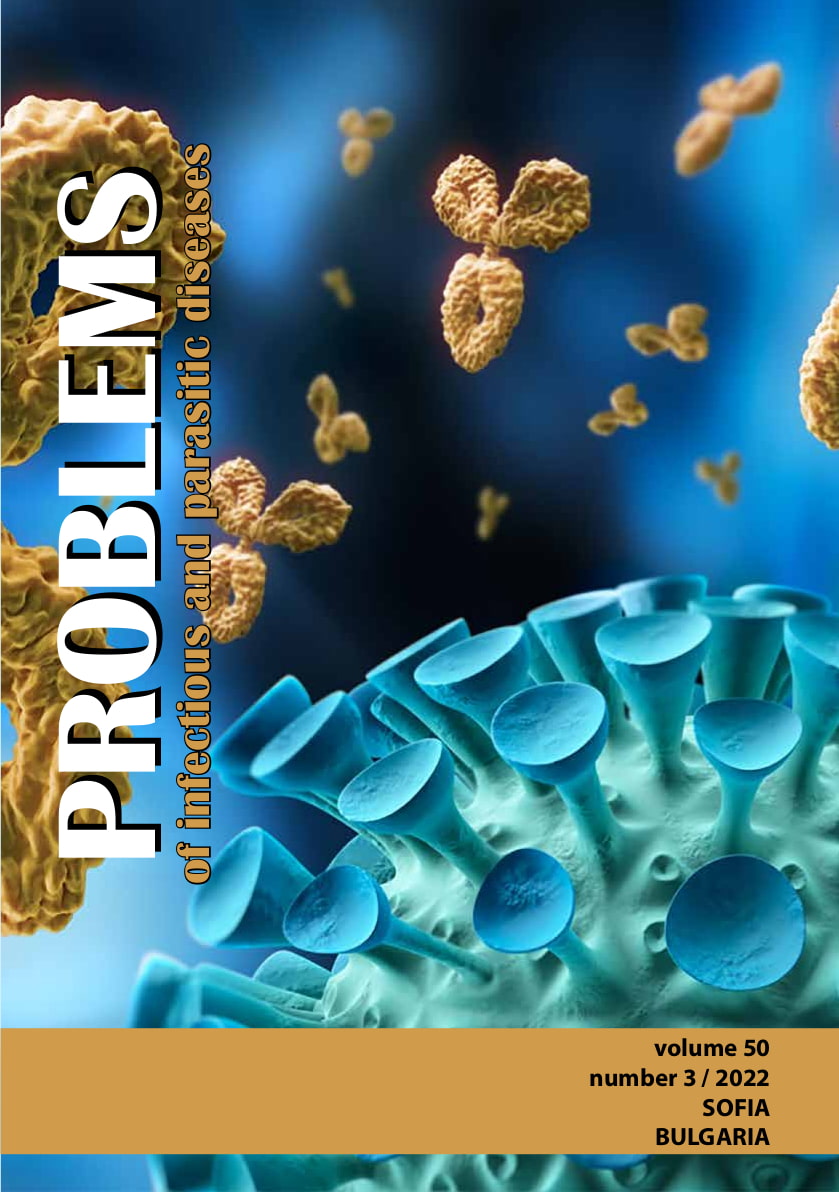SARS-COV-2 SEROSURVEY AMONG BULGARIAN HEALTHCARE WORKERS BEFORE AND AFTER VACCINATION
DOI:
https://doi.org/10.58395/2zpwv014Keywords:
COVID-19, Seroprevalence, Bulgaria, healthcare workers, vaccinationAbstract
Background: In the response to the current COVID-19 pandemic caused by the novel SARS-CoV-2, one of the groups at higher risk were healthcare workers (HCWs), especially those who worked on the frontline. The presence of SARS-CoV-2 specific IgG antibodies (seropositivity) in certain populations provides better understanding of virus circulation and transmission. Our aim was to study the seroprevalence rates of anti-SARS-CoV-2 antibodies among a group of healthcare workers before and after vaccination/COVID-19 infection.
Material and Methods: We determined the presence of SARS-CoV-2 specific IgG and IgA antibodies against S-antigen of by ELISA method. In this study, we enrolled 74 healthcare workers and three months later, 48 of the participants were followed up. At the baseline, none of the participants was vaccinated or had suffered COVID-19.
Results: SARS-Cov-2 specific IgG antibodies were found in 32.4% of the participants. Higher prevalence of class IgA antibodies – 44.6% was detected. All samples that were IgG seropositive were also positive or borderline for IgA antibodies. Overall, virus-specific antibodies were not detected in 40.6% of HCWs in the group. During the follow-up (after vaccination and/or COVID-19 infection) high rates of both IgG and IgA seroprevalence were established. SARS-C0V-2 specific IgG antibodies were detected in 95.8% of the participants. Statistically significant difference was found in the levels of IgG and IgA antibodies both before and after vaccination, p<0.0001.
Conclusions: Based on detection of anti-SARS-CoV-2 IgG antibodies, seroprevalence of 32.4% was established in an unvaccinated group of HCWs. Our survey demonstrated that asymptomatic COVID-19 infection may induce weaker humoral immune response, with production of IgA but not of IgG antibodies.
Downloads
References
Maina D, Omuse G, Ong'ete G, Mugaine Pet all. Seroprevalence, correlates and kinetics of SARS-CoV-2 nucleocapsid IgG antibody in healthcare workers and nonclinical staff at a tertiary hospital: A prevaccine census study. PLoS One. 2022; 17(10):e0267619. https://doi.org/10.1371/journal.pone.0267619
http://coronavirus.bg/bg/statistika
Manoj V, Murhekar HC. COVID-19 serosurveys for public health decision making Lancet Global Health. 2021; 9(05), E559-E560. https://doi.org/10.1016/S2214-109X(21)00057-7
Rosińska M, Stępień M, Kitowska W, Milczarek M, Juszczyk G, Nowacka Z, Gardel A, Hermann A, Bardoń-Błaszkowska A, Cudnik R, Czubak H, Wolniak-Bińkowska M, Źródłowska IA, Sadkowska-Todys M. Healthcare workers highly affected during the COVID-19 epidemic wave in Poland prior to vaccination availability: seroprevalence study. Med Pr. 2022; 73(2):109-123. https://doi.org/10.13075/mp.5893.01216
Socan M, Prosenc K, Kukec A, Zaletel-Kragelj L, Remec T, Grmek-Kosnik I. Determinants of seropositivity for SARS-CoV-2 in hospital staff in the second wave of the pandemic in Slovenia. Int J Occup Med Environ Health. 2022; 35(5):571-584. https://doi.org/10.13075/ijomeh.1896.01932
Garlantezec R, Tadié E, Heslan C, Gary-Bobo P et al. SARS-CoV-2 seroprevalence and antibodies persistence among health care workers after the first COVID-19 wave in nine hospitals in Western France. Infect Dis Now. 2022; 52(8):447-452. https://doi.org/10.1016/j.idnow.2022.09.004
Sethi S, Manuelpillai N, Mandal A, Simpson O. et al. COVID-19 seroprevalence after the first UK wave of the pandemic and its association with the physical and mental wellbeing of secondary care healthcare workers. Brain Behav Immun Health. 2022; 24:100492. https://doi.org/10.1016/j.bbih.2022.100492
Alasmari F, Mukahal M, Alqurashi AA, Huq M et all. Seroprevalence and longevity of SARS-CoV-2 nucleocapsid antigen-IgG among health care workers in a large COVID-19 public hospital in Saudi Arabia: A prospective cohort study. PLoS One. 2022; 17(8):e0272818. https://doi.org/10.1371/journal.pone.0272818
Jacot D, von Rotz U, Blondet F, Aebischer O. SARS-CoV-2 seroprevalence in hospital healthcare workers in Western Switzerland at the end of the second pandemic wave. J Med Microbiol. 2022; 71(8). https://doi.org/10.1099/jmm.0.001558
Madureira R, Ferreira SA, Marion MAL, Bettoni Fet all. Seroprevalence of SARS-CoV-2 in Emergency Department Healthcare Workers at Sírio-Libanês Hospital, Brazil. Health Secur. 2022; 20(5):359-367. https://doi.org/10.1089/hs.2022.0045
Sims MD, Maine GN, Childers KL, Podolsky RH. Coronavirus Disease 2019 (COVID-19) Seropositivity and Asymptomatic Rates in Healthcare Workers Are Associated with Job Function and Masking. Clin Infect Dis. 2021; 73(Suppl 2):S154-S1623-5. https://doi.org/10.1093/cid/ciaa1684
Grégoire C, Huynen P, Gofflot S, Seidel L, Maes N, Vranken L, Delcour S, Moutschen M, Hayette MP, Kolh P, Melin P, Beguin Y. Predictive factors for the presence and long-term persistence of SARS-CoV-2 antibodies in healthcare and university workers. Sci Rep. 2022; 12(1):9790. https://doi.org/10.1038/s41598-022-13450-4
NCIPD, Graphical analysis of data from the National COVID-19 Information System, Bulgaria, НЦЗПБ – COVID-19 (ncipd.org)
Cordova E, Bacelar B, Nieto F, Garibaldi F et al. SARS-CoV-2 IgG response in symptomatic and asymptomatic COVID-19-infected healthcare workers. Occup Med (Lond). 2021; 71(4-5):215-218. https://doi.org/10.1093/occmed/kqab061
Long, QX., Tang, XJ., Shi, QL. et al. Clinical and immunological assessment of asymptomatic SARS-CoV-2 infections. Nat Med. 2020; 26:1200–1204. https://doi.org/10.1038/s41591-020-0965-6
Brehm TT, Ullrich F, Thompson M, Küchen Jet all. Three Separate Spike Antigen Exposures by COVID-19 Vaccination or SARS-CoV-2 Infection Elicit Strong Humoral Immune Responses in Healthcare Workers. Vaccines (Basel). 2022; 10(7):1086. https://doi.org/10.3390/vaccines10071086
Ferri C, Ursini F, Gragnani L, Raimondo V et al. Impaired immunogenicity to COVID-19 vaccines in autoimmune systemic diseases. High prevalence of non-response in different patients' subgroups. J Autoimmun. 2021; 125:102744. https://doi.org/10.1016/j.jaut.2021.102744
Galmiche S, Luong Nguyen LB, Tartour E, de Lamballerie X et al. Immunological and clinical efficacy of COVID-19 vaccines in immunocompromised populations: a systematic review. Clin Microbiol Infect. 2022;28(2):163-177. https://doi.org/10.1016/j.cmi.2021.09.036
Moss, P. The T cell immune response against SARS-CoV-2. Nat Immunol. 2022; 23:186–193. https://doi.org/10.1038/s41590-021-01122-w
Tay, M.Z., Poh, C.M., Rénia, L. et al. The trinity of COVID-19: immunity, inflammation and intervention. Nat Rev Immunol . 2020; (20,):363–374. https://doi.org/10.1038/s41577-020-0311-8
Adriaenssens N, Scholtes B, Bruyndonckx R, Van Ngoc Pet all. Prevalence, incidence and longevity of antibodies against SARS-CoV-2 among primary healthcare providers in Belgium: a prospective cohort study with 12 months of follow-up. BMJ Open. 2022; 12(9):e065897. https://doi.org/10.1136/bmjopen-2022-065897
Ristić M, Vuković V, Patić A, Marković M, Petrović V. Seroepidemiology of SARS-CoV-2 Virus in Healthcare Workers before Circulation of the Omicron Sublineages BA.4/BA.5 in Vojvodina, Serbia. Vaccines (Basel). 2022;10(12):2168. https://doi.org/10.3390/vaccines10122168
Downloads
Published
Issue
Section
License
Copyright (c) 2023 Iva Trifonova, Kim Ngoc, Teodora Gladnishka, Vladislava Ivanova, Metodi Kunchev, Ventsislav Mutafchiyski, Iva Christova (Author)

This work is licensed under a Creative Commons Attribution 4.0 International License.





